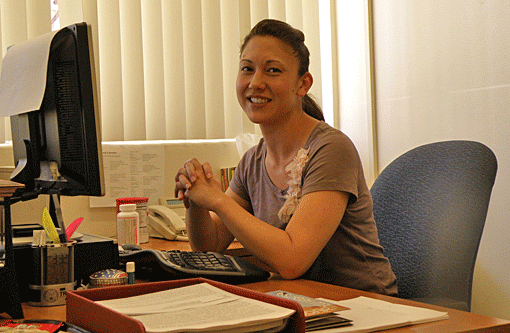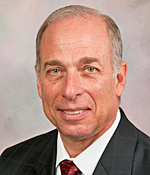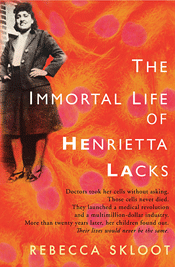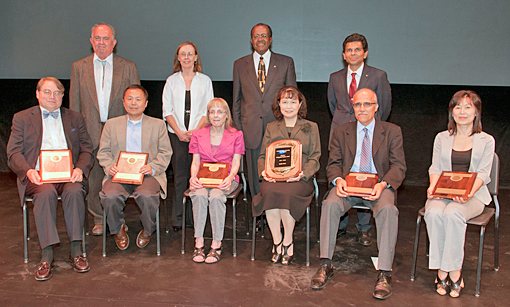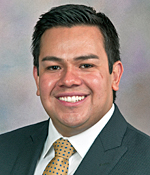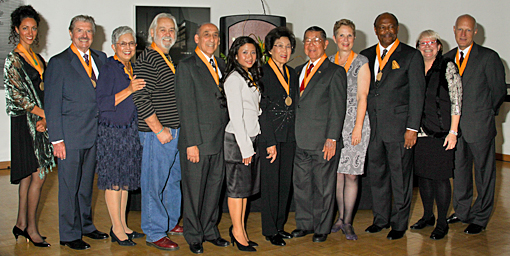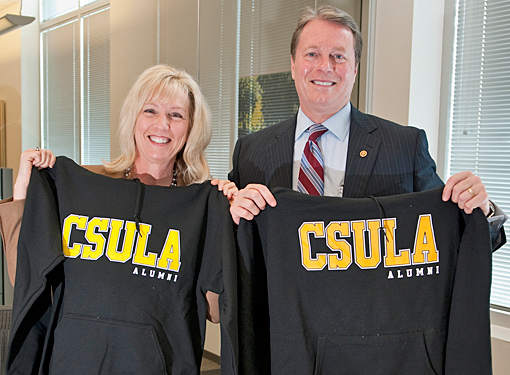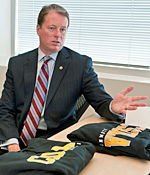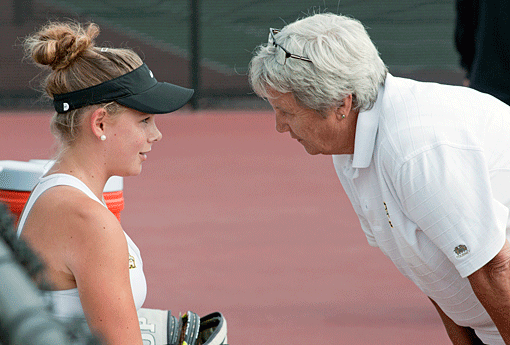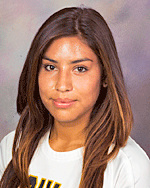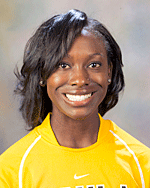
Foster the people
The Cross Cultural Centers encourage students to explore individuality while embracing understanding of a diverse campus population.
-
Expanding horizons

Honors College masterfully mixes challenging curriculum and community partnerships to entice outstanding students.
-
An ‘EPIC’ experience

Students work with community partners to link classmates to service learning opportunities as part of Educational Participation in Communities.
-
Model students

Dr. Emily Acevedo’s political science class challenges team to take on the role of ambassadors in mock-United Nations.
-
Getting on the same path

The University’s recent partnerships with local high schools and community colleges help to streamline the transfer process.
-
Sharing a legacy

Emerita professor, husband establish a memorial fellowship.
Coordinator hired to help campus veterans
As Cal State L.A.’s Veterans Affairs coordinator, Laura Shigemitsu will help the more than 500 student veterans on campus navigate the GI Bill and assist in their assimilation to college life. Shigemitsu previously worked in CSULA’s Office for Students with Disabilities in the TRIO program. Prior to CSULA, she volunteered for 10 years with the 100th/442 Veterans Association and the Go For Broke National Education Center, which preserves the stories of World War II veterans. The Veterans Affairs Office is responsible for ensuring student military veterans have a system of support. Besides helping veterans manage and receive their GI Bill benefits, Shigemitsu and work-study student veterans provide assistance to those on campus who have served.
Public safety takes pride in new building
Solar panel project
Cal State L.A.’s Technology Department involved with the University’s Power, Energy and Transportation Lab is shining a light on a solar panel project that took years of planning and development. The new photovoltaic (PV) system installed on the Engineering and Technology building was activated July 27 to collect the sun’s power and convert that energy to electricity to offset the building’s energy consumption. “;Reducing our carbon footprint, the system generates about 40 kilowatts (kWh) of renewable energy daily during the summer, which is estimated to produce about 12,000 kWh of electricity annually,” said Associate Professor David Blekhman, the director of the Power, Energy and Transportation program at CSULA. “;This installation paves the way to more systems like that on campus.” The project received funding from the U.S. Department of Energy, Southern California Edison, Honda and the CSULA College of Engineering, Computer Science, and Technology. For more about the lab:/academic/ecst/programs_and_facilities/pet_lab.php
For real-time data regarding the solar energy generated by the project:http://www.sunnyportal.com/Templates/PublicPage.aspx?page=c808553b-d904-45d1-bcd3-5732c7c98c85
One campus, one book
For information, visit http://calstatela.libguides.com/OCOB.
Counseling program a success
The Charter College of Education is partnering with the Los Angeles Unified School District to provide counseling services to elementary school students. The SUCCESS program is led by Associate Professor Sheri Atwater, in the Division of Special Education and Counseling. Graduate students learn communication techniques and theories for counselors and therapists, and are assigned to clients in the spring quarter. This spring, El Sereno Elementary School students had eight weeks of counseling from Cal State L.A. students enrolled in Counseling 507: Individual Clinical Counseling. At the course’s completion, the counselors earn their credential, and the ability to accept clients (under one-year supervision) in K-12 schools throughout the state.
Educators honored at Fall Faculty Day 2011
Pictured: CSULA’s Outstanding Professors (front row from left) Outstanding Lecturer Simeon Slovacek, Feimeng Zhou, Sharon H. Ulanoff, Kylie Hsu (President’s Distinguished Professor), Ali Modarres, and Atsuko Sato; (back row from left) Award Selection Committee Chair David Diaz, Academic Senate Chair Nancy Hunt, President James M. Rosser, and Provost Ashish Vaidya.
Six faculty members were honored for their excellence in teaching and significant achievements during the University’s Fall Faculty Day. Among the recipients for the Outstanding Professor Awards were Ali Modarres, a professor of geoscience and environment; Simeon Slovacek, professor of education, Division of Applied and Advanced Studies in Education; Sharon Ulanoff, professor of education, Division of Curriculum and Instruction; and Feiming Zhuo, professor of chemistry and biochemistry. The Outstanding Lecturer Award was given to Atsuko Sato, a political science lecturer. This year’s President’s Distinguished Professor Award went to Kylie Hsu, a professor of Chinese linguistics, Department of Modern Languages and Literatures. Hsu is an internationally-recognized scholar, published author and a key faculty member in establishing the University’s Chinese Program and Asian and Asian American Studies.
Mark your Calendar
- John Souza
Through Jan. 14, 2012
Luckman Gallery
Los Angeles-based artist, educator, and curator John Souza has produced a significant body of artwork over his 30-year career. This exhibition draws attention to this important artist who incorporates personal history, cult fantasy, dystopian ideas, and digital surrealism in works that span many different artistic mediums. This comprehensive show situates rarely-seen past projects alongside new work. Gallery hours: Mon.-Thu. and Sat., noon-5 p.m. For more information, call the Luckman Gallery at (323) 343-6604. - Aaron Neville
Dec. 17, 8 p.m.
Luckman Theatre
A multi-Grammy Award-winner, Aaron Neville is undoubtedly one of the most prolific artists in the R&B genre. A powerful and soulful vocalist, Neville is known for his signature vibrato that rises and dips, full of passion, and utterly sincere; National Public Radio says, “Aaron Neville is an icon.” Celebrating 50 years as a recording artist, Neville will perform a special concert to celebrate the holiday season. For more information or for tickets, visit www.luckmanarts.org or call the Luckman Box Office at (323) 343-6600. - Luckman Jazz Orchestra: Hank Mobley
Jan. 21, 2012, 8 p.m.
Luckman Theatre
Hank Mobley stands out as one of the most revered tenor saxophonist and composers of the hard-bop era in jazz. Mobley’s style was laid-back, subtle, and melodic, especially in contrast to players like Sonny Rollins and John Coltrane. The outstanding musicians of the Luckman Jazz Orchestra, conducted by Charles Owens, will honor Hank Mobley’s great contributions to jazz by playing newly arranged renditions of his music. For more information or for tickets, visit www.luckmanarts.org or call the Luckman Box Office at (323) 343-6600.
A complete listing of campus events is available at www.calstatela.edu/calendar.
ALUMNI ASSOCIATION PRESIDENT
Graduated: 2004
Degree: Bachelor of Arts in Communication Studies
Home life: Lives in Montebello with wife Corrine, a Corporate Environmental Affairs Representative with The Walt Disney Company.
Q: What do you do?
A: I am the manager of Public Affairs and Government Relations at Vons, where I am responsible for the company’s media government and community relations programs in southern California and southern Nevada
Q: What inspires or motivates you to stay involved with your alma mater?
A: Both of my parents graduated from Cal State L.A. and so did my wife. Like so many of our students, all three were the first in their families to go college. I’m grateful for the opportunity to repay Cal State L.A. for providing me and my family with a strong educational foundation. Also, I want to make sure that it continues to be a place that helps students from all walks of life strive for excellence and maximize their potential.
Q: In what capacity are you involved as an alumnus?
A: I have the pleasure and responsibility of serving as an ambassador and advocate for the University — demonstrating the power and potential of a Cal State L.A. education and making the case in Sacramento for supporting the needs of the CSU.
Q: Why are partnerships with the community important and how does the Alumni Association help that effort?
A: Partnerships are key, especially in a city as big as Los Angeles. Cal State L.A. has always been engaged in the community and the Alumni Association has played a key role in that.
Become a mentor:
Looking for a way to give back to your alma mater? Have a lot of knowledge that you’d like to share? Then sign up for Cal State L.A. Alumni Association’s Alumni Mentoring Program.
A mentor works as a teacher, problem-solver, a motivator, coach and guide to facilitate personal and professional growth in an individual by sharing the knowledge and insights that have been learned through the years.
Learn how to become a successful mentor, enhance your leadership skills, improve your career development and add a meaningful and rewarding experience by sharing your knowledge and experience with others.
For more information or to sign up, contact the Alumni Association at (323) 343-ALUM or log on to alumni.calstatela.edu.
37th Annual Alumni Awards Gala:
The following people were honored at the 2011 Annual Alumni Awards Gala in October. From left: Amira Francesca Ainis ’11; Roland D. Kelly '56; Maria Casillas ’78; Frank Edward Romero ’09; Matthew R. Landano ’63 ’68; Stephanie Moreno Aoalin ’12; Annie Chin Siu, D.D.S.; Tim K. Siu, M.D.; Elisa Crystal Callow ’90; E. Frederick Anderson ’65; Joan Feldman ’78; and Ronald Bension ’81.
The Alumni Association celebrated its standout stars at the 37th Annual Alumni Awards Gala on Oct. 6, which took place at the Luckman Fine Arts Complex at Cal State L.A.
The event honored the achievements of seven alumni, two students, friends of the University and one faculty alumnus in areas including professional achievement, University service, community service and/or academic achievement.
Those honored during the event were:
- Alumnus of the Year: Frank Edward Romero ’09
- University Service Award: Annie Chin Siu, D.D.S. and Tim K. Siu, M.D.
- Distinguished Alumna, College of Arts and Letters:Elisa Crystal Callow ’90
- Distinguished Alumnus, College of Business and Economics: Roland D. Kelly ’56
- Distinguished Alumna, Charter College of Education: Maria Casillas ’78
- Distinguished Alumnus, College of Engineering, Computer Science, and Technology: Matthew R. Landano ’63, ’68
- Distinguished Alumnus, College of Health and Human Services: Ronald Bension ’81
- Distinguished Alumna, College of Natural and Social Sciences: Joan Feldman ’78
- Distinguished Faculty Alumnus: E. Frederick Anderson ’65, Ph.D., L.C.S.W.
- Outstanding Graduate Student: Amira Francesca Ainis ’11
- Outstanding Senior Student: Stephanie Moreno Aoalin ’12
For more information, please contact the Alumni Association at (323) 343-ALUM (2586) or email [email protected].
Alumni Spotlight: Bill ’82 and Kathy Lewis
Couple inspire, encourage scholars to pursue opportunities made possible through annual gifts
For every dollar that Bill ’82 and Kathy Lewis contribute to Cal State L.A., they know that the University will get twice as much in return.
That’s because the Lewises have been able to capitalize on a corporate matching program offered through Kathy Lewis’ work. Her parent company, Novartis, will match up to $5,000 a year in an individual’s contributions to an educational organization.
“We have been able to enhance our giving through this program,” Kathy Lewis said. “It allows for our dollars to go further, so we don’t have to pick and choose. We can help students whether they are three years old or 25 years old.”
Most of the Lewises’ giving and volunteer work, they said, is channeled through organizations that support education and community. Education, in particular, is important to the couple because it “creates opportunities” that have the possibility to transform lives. While at Cal State L.A., Bill Lewis said he not only received a top-notch education but he built life-long friendships through the fraternity Sigma Alpha Epsilon.
“It really enhances your ability to better yourself and hopefully be a better person,” said Bill Lewis, who earned a bachelor’s degree in business administration and management.
As an older student, pursuing a second degree and working while doing it, Bill said he can relate to the situation so many Cal State L.A. students find themselves in. For them, financial support can often mean the difference between having time to study and pass a class, and dropping out of school.
“I was very fortunate and I’m very thankful for that,” Kathy said. “I was able to get my degree and graduate without any student loans. But, not everyone has that opportunity.”
In recent years, the Lewises have focused their giving at Cal State L.A., supporting some the University’s highest-achieving students through the President’s Associates. The University’s premier giving level, the President’s Associates supports scholarships for students in the Honors College and President’s Scholars program.
“It really appealed to us to be able to target students who were high achievers and needed a little extra help in getting their college degree because the opportunities that we are able to give them mean something,” Bill said.
Another reward of giving, the couple notes, is a strengthened connection to the University and broader knowledge of all that is available to students today.
“We are so much more aware of how much Cal State L.A. is doing with focuses in biotechnology, engineering, nursing, teaching and more,” Bill said. “And we are able to take that and share it with our friends.”
2000s
-
Denise Munro Robb (’02) is now a full-time professor of political science at Pierce College.
-
Adriana Ustarez-Oji (’03) is one of the new dentists at Family Health Center Network in Visalia, treating both children and adults.
1990s
-
Louis Celaya (’96 M.S.), the Agoura Hills assistant to the city manager, was presented the city’s Employee Service Award.
-
Pankit Doshi (’99), an associate in Jackson Lewis’ Los Angeles office, has been appointed by the State Bar of California Board of Governors to serve a three-year term (2011-14) on the State Bar of California Council on Access and Fairness.
-
Delia Estrada (’95 M.A.), a 24-year veteran of the Los Angeles Unified School District, is the new principal of Taft High School.
-
Cindy Giang (’96, ’02 M.A.), a teacher at Quail Summit Elementary School in Diamond Bar, has earned a literacy award from the American Literacy Corporation.
-
Mary Kate Haley (’99 M.F.A.), the associate and executive producer of the Entertainment Technology Center at Carnegie Mellon University and faculty member, addressed the Notre Dame Class of 2011 at commencement.
-
Michael Hoon (’95, ’01 M.A.) is the new principal of Hollingworth Elementary School in Rowland Heights.
1980s
-
Mark Anthony Chavez (’84) has been named the executive director of the Boys & Girls Clubs of La Habra by the board of directors.
1970s
-
 Leslie Kerr (Kosinski) (’77) has been named senior associate director of development at the University of New Haven.
Leslie Kerr (Kosinski) (’77) has been named senior associate director of development at the University of New Haven. -
Eugene Masuda (’78) is serving his first term as the first Asian American elected to Pasadena City Council.
-
Darline P. Robles (’72), a professor of clinical education at Rossier School of Education at USC, was appointed by President Barack Obama to the President’s Advisory Commission on Educational Excellence for Hispanics.
-
Gary W. Studebaker (’70), a special education adjunct instructor at National University, wrote a book titled Autism Spectrum Realities.
-
Dave Ungerer (’73), a teacher and program coordinator for AVID at Kaiser High School in Fontana, was named teacher of the year by the Hispanic Scholarship Fund.
1960s
-
Sal Castro (’61), an educator and activist, has co-authored Blowout!: Sal Castro and the Chicano Struggle for Educational Justice, a book chronicling the walkouts of Chicano students that sparked the beginning of the urban Chicano Movement of the late 1960s and early ’70s.
-
 Ernest Moreno (’69) retired as president of East Los Angeles College in August. Moreno was appointed to the position of vice president of academic affairs in 1991. He remained in that post before assuming presidency in 1994.
Ernest Moreno (’69) retired as president of East Los Angeles College in August. Moreno was appointed to the position of vice president of academic affairs in 1991. He remained in that post before assuming presidency in 1994. -
Rose M. Ochi (’67), executive director of the California Forensic Science Institute at CSULA, received a plaque on behalf of the Institute at the 2011 DNA Educational Awareness Forum.
-
Karl Raschkes (’66, ’74 M.A.) has retired after a 46-year career as a music teacher and administrator in Oregon. Under his leadership, Salem-Keizer high schools won national Grammy awards and 71 championships with choir, band, string and symphony orchestra.
-
Donald Strametz (’68, ’76 M.A.) is retiring from a 31-year coaching career at Cal State Northridge. Strametz coached both male/female cross country teams at CSUN.
1950s
-
Frank DeSantis (’57, ’72 M.A.), affiliated with Harbor-UCLA Medical Center Administration, was honored with a ‘Professor for a Day’ plaque and dinner in May.
-
G. Dana Hobart (’59) is serving his third term as Rancho Milagro mayor.
In Memoriam
- Shifra M. Goldman (’66 M.A.) was an author and advocate for Latin American and Chicano art. As an activist scholar, she fought against Eurocentrism and was a long-time professor at Santa Ana.
- Stephen J. Haims (’62, ’68 M.A.) taught English for more than 30 years at Pasadena and Arcadia high schools.
- Patricia Marie Hodges , a professor emerita of psychology and former chair of the Psychology Department. She was an active faculty member at Fielding Graduate University, and founder and president of Claremont Psychological Services.
- Lois Vivian Johnson , a professor emerita of education, wrote two classic textbooks on classroom group behavior during her 26 years at CSULA. In retirement, she wrote historical fiction and painted.
- Mary A. Kramer , emerita associate professor from the Department of Family Services and Consumer Sciences, taught foods and nutrition in the then-Department of Home Economics. She led several foreign study trips for students and wrote two books during her 28-year career at CSULA.
- Roy G. Main (’88 M.A.), a former faculty member, had a long career as a freelance studio trombonist in Los Angeles, performing at major television and film studios. He worked with legendary artists such as Frank Sinatra, Mel Torme, Bob Hope and Tony Bennett.
- Phyllis M. Meyers (‘74) for 20 years served as health educator and consultant for Merced County and the State of California promoting health in disadvantaged and rural areas.
- Maxine L. Miller , emerita professor of Home Economics, taught interior design and served on the Academic Senate. She worked as a flight attendant for TWA before joining the CSULA faculty in 1955.
- Marie Nyman Ohlsen , emerita assistant professor of English, taught and counseled at Muir City College in Pasadena, San Marino and South Pasadena high schools before she was hired as an assistant professor at CSULA, where she taught Shakespeare and poetry.
- Joanne E. Saeta (’84 M.A.) had a long career in education that included work as an elementary school teacher and a reading specialist. She was especially dedicated to South Pasadena schools, where she helped create the South Pasadena Education Foundation.
- Floyd R. Sawyer (’64 M.A.) taught English and social studies in the Covina Unified School District for 44 years. He pioneered the first Mentally Gifted Minds program at Sierra Vista Middle School.
- Burton Marshall Seidler , emeritus professor of physical education, was a knowledgeable source in early childhood physical education during 30 years of teaching.
- John L. Shelton (’61, ’63 M.A.) made early contributions to the gospel music community as part of the Shelton Brothers and later continued his music ministry in the Baptist Church while working days as a real estate officer.
- Hershel K. Swinger (’66, ’68 M.A.) was a retired professor of counselor education. He founded and was senior director for Project Fatherhood, through Children’s Institute, which was nationally recognized for helping disadvantaged fathers develop better parenting skills.
SPORTS-TEAMWORK
When Liz Franco joined the women’s soccer team at Cal State L.A. in fall 2007, it seemed the program was poised for a breakthrough. Started in 1995, the team’s first winning season was in 2004 and was yet to record a 10-win season.
Two All-America awards, a conference Most Valuable Player honor and a team conference championship later, Franco can look back on a rewarding four-year Golden Eagle career. She can also take the lessons learned from being part of an intercollegiate team to apply as she prepares for life after college.
Liz Franco
“I had a great experience playing for Cal State L.A.’s women’s soccer team for four years and learned that teamwork is the key to success,” Franco said. “Communication, leadership, respect come from teamwork that helped me build my speaking skills and the ability to work with a group. Participation is easier for me because, after being a captain for two years, speaking in front of an audience now comes naturally.”
Franco, who hopes to pursue a career in sports administration, was on Cal State L.A. teams that won 52 matches over four seasons, including a first-ever California Collegiate Athletic Association championship in 2009. In her 2007 freshman season, the Golden Eagles qualified for the NCAA playoffs for the first time and advanced to the West Region championship match. Over her last two seasons, the Golden Eagles were a combined 32-7-3, with the conference’s best record both years.
Khadijah Greenwood, Franco’s teammate on the 2007 and 2008 squads, and three-time All-CCAA forward, is pursuing a career in nursing. She says being on a team helped her in her chosen career.
Khadijah Greenwood
“I developed a lot of good relationships with my teammates and coaches. One thing you get is the opportunity to work together,” Greenwood said. “I was able to improve my communication skills, which is key in nursing. You have to be able to communicate with doctors and patients to determine the best possible care.”
Another aspect of being on a team is learning how to get along with teammates of diverse backgrounds. Cal State L.A. women’s tennis coach Sandy Kriezel said she always enjoys seeing student-athletes learn about other points of view and eventually grow to become a tight-knit team.
“Being on a team opens their eyes to other people’s beliefs and life experiences,” Kriezel said. “I think sharing a personal space with people who are different makes them well-rounded. Many have very limited life experiences before they come to college and to see them grow as young adults over the course of the next few years is enjoyable to see.”
Even in sports like track and field, where student-athletes compete in individual events, there is a team-building aspect. Eugene Hutchinson, a two-time national runner-up in the high jump at Cal State L.A. who is now a coach at Maranatha High School in Pasadena, said being a team captain helped him acquire leadership abilities that he has been able to use since graduation.
“It was a great experience for me because I was able to come in right away and take on a leadership role. That helped me grow as a person and I gained a certain maturity and a level head,” Hutchinson said. “There is a team aspect to track and field because you train together and travel together and at the end of the year, when your team is trying to win a national championship, it’s a team effort because it takes more than one individual to win it.”
Hutchinson, who holds the school record in the high jump, also said being on a collegiate team teaches the student-athletes responsibility -- traits valuable in the work place.
“You have to be responsible. You have to show up every day to practice. You have to be motivated and have a drive to do it every day,” Hutchinson said. “That’s something you need to carry with you. You have to wake up every day for your job. You have to want to be successful or you won’t be successful in the corporate world.”
Thoughts on Community Service
Ernesto Brooks
Television, Film and Media Studies
“Community service is good because it gives you a chance to get involved in the community and it allows you to experiment with different things. It allows you to try different careers, so to say, because you get to explore things like me, for example, I volunteered at the hospital, so I got to see people like doctors, nurses all that kind of stuff. You get hands-on experience, which is very helpful for an individual because you get to see if you’re interested in that particular thing. And it’s great for all people considering certain careers, you can volunteer in that area.”
Andrea Aguilar
Communication Studies
“I believe community service is important because it allows people to get together and help out without needing the financial status. I’ve done community service and I’ve helped out a lot of people. And it just brings everybody closer and it’s a fun way that everybody can have fun and help the community out.”
Michael Leung
Urban Learning
“Community involvement is important because I believe we can gather all the people together to form as a group, to help each other to make the world much happier than it is. And it will help with collaboration and teamwork to help each other out. I used to serve in the Boy Scouts, so I’ve done a lot of community service and earned my Eagle (Award) that way because of a requirement to serve in communities. Make everyone happy because I was able to paint schools, decorate schools and also went to the hospital for the disabled and old people to decorate their houses and make them feel welcome. …”
Deborah Ingram
Television, Film and Media Studies
“Community involvement is important because there are a lot of children in the community who need help and they may need things whether it be tutoring, whether it be clothes, whether it be food and we won’t proceed as a country or as a world if we don’t help our future out.”
Cinthia Vargas
Criminal Justice
“I think community involvement is important because this is our community and we’re supposed to give back to it and help each other out. I have donated blood, like about, three times so that’s really important because it’s not for me but it’s for the other people in my community that need it. I also have cleaned the streets like, like three years ago, but I still give back to it. They didn’t give me anything but I wasn’t expecting something back because this is our community, this is where we live, and we’re supposed to help each other out.”
Christina Bobik
Urban Learning
“I think community involvement is important because it is your community and you’re contributing to the wellness of your community. If you want a good community, you have to take part in it becoming a great community in itself. … How I’m involved is I do a lot of humanitarian aid projects through my church services. We do blankets for children in need. Recently I’ve done dresses to send to Africa since they are in poverty.”
